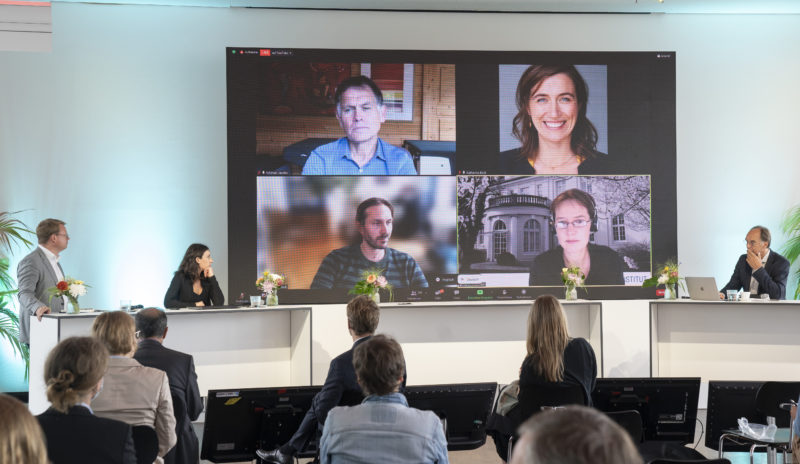INNOVATION LAB
From Growth to Degrowth – In Search of a New Development Paradigm
Should economies continue to grow in the face of rising environmental challenges and social costs? Michael Jacobs and Xhulia Likaj explored this question for our prosperity symposium.
BY
SONJA HENNENPUBLISHED
2. SEPTEMBER 2021READING TIME
4 MIN
With general environmental indicators on decline, a planet arriving at a state of emergency and rising inequality rates, the heated debate around the future of economic growth doesn’t run out of fuel. In an effort to shed light on a decade long conflict in economics, Michael Jacobs from SPERI and Xhulia Likaj from Forum New Economy presented insights into the growth debate from their soon to be published Forum working paper at our recent symposium on prosperity in the 21st century. The event took place in collaboration with The New Institute.
Xhulia Likaj started the session off by explaining the motivation for the paper – to move closer to the center stage of economics a debate which, for all its faults and ideological warfare, addresses the most pressing issue humanity is faced with today. From a historical perspective on the growth debate, to the creation of the growth paradigm and first critiques of growth as a goal in and of itself in the 1970s, to an overview of different growth-critical and growth-agnostic approaches, the paper provides an in-depth overview of the different arguments which have been made, and the different conclusions reached, in the debate about the possibility and desirability of economic growth. Those arguments then laid the ground for the discussion to follow.
Most importantly, Michael Jacobs emphasized, GDP growth does not create social benefit in an automatic sense, as is often assumed. If we want to achieve environmental sustainability and social wellbeing, we need to focus on those things directly, rather than on growth alone.
At the same time, he stated, attacking growth is not an effective political strategy because growth is so deeply embedded into our political system. Rather, economists, politicians and society generally should focus on the things we desire directly. This position forms part of a larger body of research and scholarly debate, embraced under the umbrella term of post-growth. On the 50th birthday of the Club of Rome report, this is what the growth debate, according to Jacobs, should move towards.
Nils aus dem Moore, professor at RWI Essen, added that we cannot successfully defuse the growth debate without adding to it the important question how planetary boundaries and a ‘good life’ can be defined – and how that definition can then be socially dispersed.
Katharina Beck, from Bündnis 90/ Die Grüne, agreed, but emphasized the importance of decomposing the latest insights into the growth debate into concrete political measures. Growth, she said, is not inherently good or bad – what matters, is the question how we can achieve the goal of living well with everyone within planetary boundaries.
Karen Pittel from ifo stated that reaching high levels of prosperity, rather than growth should be the goal. To determine how we can design policies that meet this goal, is the true challenge, more so than the debate around growth. By focusing on growth, she said, we focus too much on beliefs, where it is actions that matter.
Finally, Michael Jakob from MCC Berlin, welcomed the fruitful discourse and partial synthesis of proposals originating from different spectrums of the growth debate. At the same time, he critiqued that even post-growth concepts that claim to be agnostic to growth, rely on the very term. Instead, he proposed the term ‘sustainability transition perspective’.
